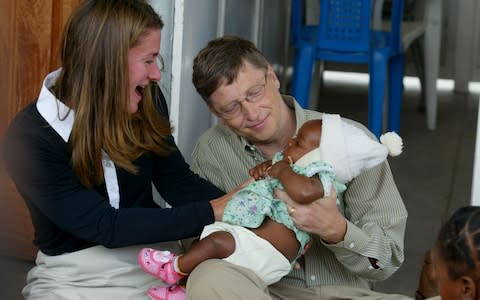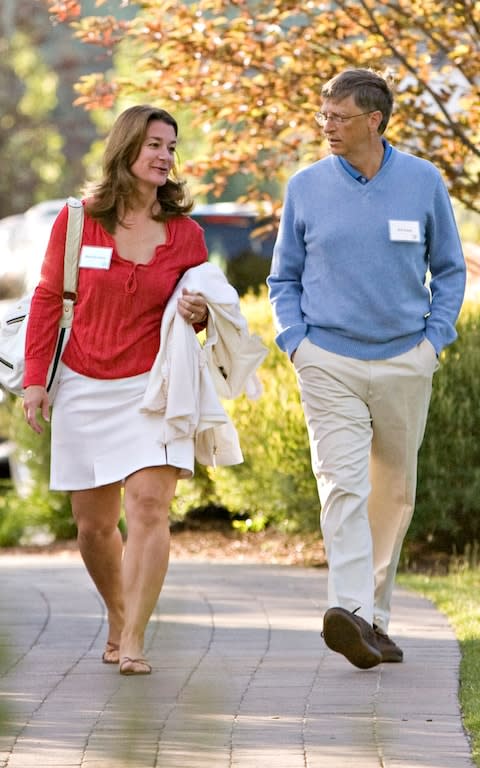Bill Gates: ‘My biggest fears about what's coming next for this world’

The seat of power in Bill Gates’s empire occupies the top floor of an anonymous suburban office block overlooking Seattle’s Lake Washington. Here, in the inner orbit of the second richest man on earth, everything – down to the modern artwork and screens embedded into the walls, to the gleaming staff canteen replete with a faux wood-burning stove – is curated to the utmost precision.
No more so than the man himself, whose daily schedule is managed by assistants into five-minute chunks. When Gates arrives for our interview in his glass office, nicknamed “The Fishbowl”, he cuts an immaculate presence, tall and surprisingly suave in dark trousers and slate grey cashmere. The only blot is a marker pen smudge running the length of his left palm, presumably from scrubbing furiously at some white board earlier that day. Even in the 62-year-old Microsoft founder’s second life as the world’s philanthropist-in-chief, the old number-cruncher dies hard.

So, too, the ability to always keep one eye on the future. When I ask which challenges to global health security he fears the most, Gates outlines three: antibiotic resistance, cuts to government funding to improve health in the world’s poorest countries, and the next unknown disease, referred to by the World Health Organisation simply as ‘Disease X’.
“We are not fully prepared for the next global pandemic,” he says. “The threat of the unknown pathogen – highly-contagious, lethal, fast-moving – is real. It could be a mutated flu strain or something else entirely. The Swine Flu and 2014 Ebola outbreaks underscored the threat.”
There is another threat on his mind, one which has often been treated as the ‘elephant in the room’ in the world of international development. Namely, the population explosion in Africa's poorest countries and its future impact - either fueling poverty, political instability, conflict and refugees, or sparking a new boom in world growth as happened in India and China.
Related Video:
For more news videos visit Yahoo View.
This concern – and how to manage it – dominates the second annual publication of the Bill and Melinda Gates Foundation’s Goalkeepers Data Report, which is released today and tracks the greatest challenges faced across the world.
To put it bluntly decades of progress in the fight against poverty and disease may be on the verge of stalling
Bill Gates
True to form for a man who, early on at Microsoft, memorised the numberplates of employees so he could monitor who was putting in the hours, the report contains a startling level of detail. But above all is one simple fact that even the eternally optimistic Gates warns could mean “to put it bluntly decades of progress in the fight against poverty and disease may be on the verge of stalling”. In short, as birth rates falter in the developed world, in the poorest parts of Africa they are booming. By 2050, the ten poorest countries on the continent are projected to more than double in population.
“The thing that is mind-blowing is if the demographers who have been very accurate on these things are right about Africa, then you are going from 1bn today to 2bn at middle of century, to 4bn at the end of the century,” he says.
The Bill and Melinda Gates Foundation started in 2000, an amalgamation of the various philanthropic wings of the couple who married in 1994. It is now 10 years since Gates left Microsoft to work full-time at the foundation. Even in that short time, the world has been transformed by the technology Gates created.
The man who once famously dreamt of a “computer in every home” still clearly possesses an unstinting faith in the power of tech. He posts regular updates on Facebook and Twitter, where he counts 45.8m followers. His waterfront mansion in the nearby Seattle suburb of Medina is reportedly equipped with tens of thousands of dollars’-worth of screens and sensors. Amazon’s Jeff Bezos, who this year overtook Gates on the annual Forbes rich list, with a fortune of $112bn compared to his $90bn, is a neighbour.

But the “honeymoon period of tech”, he admits, has now come to an end. Gates says he believes technology companies should be better regulated and its impacts (particularly on young people) better understood; through its Duty of Care campaign, the Telegraph has been calling for digital companies to have a legal obligation to protect children using their services.
It is up to governments to understand what things should be regulated
Bill Gates
“Governments will decide,” he says. “Just like families decide what are the rules for your kids, governments have to really get educated on these things. Yes, these companies are trying to be benign and individuals involved are not malign, but at the end of the day it is up to governments to understand what things should be regulated.”
We are talking now, it is clear, about the Facebook founder Mark Zuckerberg, who is one behind Gates on the global richlist and whose social media company has been hit by a number of scandals over the spread of disinformation, disruption of elections and misuse of private data.
“Even he [Zuckerberg] didn’t predict everything that would go on in terms of it being used a platform for political influence,” says Gates, who is something of a mentor to the 34-year-old, not least in pursuing his own philanthropic ventures.

“They will step up in a pretty strong way to all those things. People who are super-successful need to be held to a very high standard. Some of that will lead to a very unfair personalisation as though these mistakes are somehow down to flaws in Mark’s character, or something like that. Mark knows he is in a position of responsibility and is trying to learn about this stuff.”
On Elon Musk, another tech billionaire who recently provoked negative headlines for bizarre behaviour which included publicly accusing a British diver who helped rescue 12 boys from a flooded cave in Thailand of being a paedophile, Gates is rather more circumspect. “I don’t know Elon as well,” he says. “I haven’t spoken to him about his challenges. I’m not sure he is someone anybody needs to feel sorry for.”
The technological age has also engendered a crisis in western democracy, with society appearing increasingly polarised. Gates admits he finds the current lack of trust in the press, academia and politicians “a little scary”. So, too, the trend to be “more nationalistic and inward looking and less global”; something embodied in the US President’s policy of ‘America First’ and, he says, to a lesser extent, Brexit.
Gates commends Theresa May’s recent Africa tour where she recommitted to Britain’s aid spending target of 0.7 per cent of gross national income. He says he has attempted to meet with Jeremy Corbyn, although so far failed, due to a schedule clash.
“Philanthropy”, Bill and Melinda Gates wrote in an open letter published earlier this year marking the 10th anniversary of the foundation, “is a basic responsibility of anyone with a lot of money.” In the letter, Melinda also criticised the increasing amassing of wealth in the hands of the few: “It’s not fair that we have so much wealth when billions of others have so little.”

Prior to getting married, the couple (who met at a trade fair dinner in 1987) say they often talked about giving it all away. They have already publicly pledged to leave their fortune to charity, rather than pass it on to their three children, aged between 16 and 22.
Such zeal was inherited, in part, from his father William Gates Senior, a lawyer and another avowed philanthropist who, intriguingly, bearing in mind Gates’s new warnings about population, was an advocate and campaigner for birth control in the US. But the decision to focus so heavily on women’s rights in the developing world also stems from the influence of Melinda.
“With my family, by the time you got to my generation, the idea that my two sisters and me would go to college [was accepted]. There were no professions not open to them, that was pretty clear,” he says. “Likewise, in Melinda’s family. That extreme idea about roles, at least in mid-to upper-class US families, a lot of progress had been made.”
You don't want to live in a poor household but being a woman in a poor household is particularly bad
Bill Gates
In terms of having a meaningful impact on population rise in Africa, Gates stresses the obvious perils of attempting any draconian, top-down policy in the manner of China and India. Instead, he hopes, meaningful change can be realised through improving access to birth control and educating and empowering women, as well as improving economies.
“You don’t want to live in a poor household,” he says. “But being a woman in a poor household is particularly bad. And that is true globally.”
Being a rich man in a divided world is, of course, the best lot of all to draw. But this billionaire will keep working to change that.
Protect yourself and your family by learning more about Global Health Security

